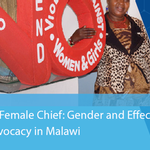It takes a female chief: The role of traditional authorities in reform work
When female senior chief Theresa Kachindamoto in Malawi annulled 850 child marriages in 2016, she made it to the headlines in international news media. Researchers are now studying how leaders like Kachindamoto can create acceptance for reforms like the ban of child marriage.
Promoting gender equality in countries that score poorly on women’s rights is challenging, but experience shows that female traditional authorities like Theresa Kachindamoto can play a pivotal role in getting people to accept reforms. Their role as effective policy advocates is increasingly acknowledged. Yet, research on them and the role they play have so far been scarce. A team of researchers from CMI, Portland State University and the University of Malawi have put female traditional authority on the agenda. In a survey experiment they study how the type and gender of authorities affects how people receive messages about reforms. Does it matter whether the reform is pushed by a traditional or state authority, or if the leader pushing the reform is male or female?
Taking advantage of gender stereotypes
Gender law reforms are pursued in many countries that have traditionally been dominated by a patriarchal culture. Often, what has been a slow birth gains speed from engaged local leaders. Donors have increasingly come to involve and depend on traditional leaders in reform work, but they tend to turn to male leaders for assistance. The survey experiment shows that their reliance on male traditional leaders may backfire.
- Child marriage reform is a gender- sensitive policy area, and is typically seen as a policy domain where women have stereotyped competencies. Using male traditional leaders to promote women’s rights can under certain circumstances increase resistance to such reforms, says Vibeke Wang, researcher at CMI.
Theresa Kachindamoto is a prime example of the firm authority and influence female traditional authorities can have. When she annulled hundreds of child marriages and suspended all village heads that refused to ban the practice of child marriage, she was portrayed as an exceptional case as she hit the headlines worldwide. But in reality female traditional chiefs have a lot of power in Malawi, and many of them were involved in the processes leading up to a law that banned child marriages in 2015. They have also been crucial actors in follow up campaigns and the actual implementation of the new law.
In fact, several African countries have a strong tradition of female traditional leaders, and the findings from Malawi are likely to be valid also in other countries in the region.
Lessons for future reforms
So when is support from traditional leaders a decisive factor? Do you need brothers in arms or sisters in arms? It is tempting to give an easy answer to the question, saying that whenever you are working on reforms that involve women’s rights, female traditional leaders are your best choice. And the survey experiment shows that, in general, joining up with female traditional leaders has a positive effect. Because people tend to perceive advocacy areas like child marriage as falling within the typical competencies of female authorities, female traditional leaders can be very effective policy advocates.
Yet, context sensitivity is crucial. In working with the gender-sensitive child marriage law reform in Malawi, female traditional leaders were the most effective advocates. The answer to who the best ally is always depends on several factors: The leader/authority’s gender and position as a traditional leader versus someone who is part of the state institutions, and not least characteristics of the people you want to influence. Among people who do not support gender equality, endorsements from a male authority is more effective.
-If you get the wrong authority on board to back up your message, you risk doing greater harm than good, says Wang.
The need for solid contextual knowledge makes human rights reform work time-consuming. In order to succeed, anyone, be it national authorities or international organisations, trying to implement reforms and policies have to consider taking into account authority type and gender, and the characteristics of the people who are affected by the reform.
-You need to take your time to find the influential key actors that can be effective in getting the message across. Having them on your team will make the job easier, says Wang.
Publication


